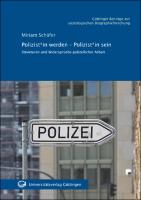Polizist*in werden
Polizist*in sein - Strukturen und Widersprüche polizeilicher Arbeit
Author(s)
Schäfer, Miriam
Collection
AG UniversitätsverlageLanguage
GermanAbstract
In public discourses in Germany, the police as an institution is presented on the one hand as our “friend and helper” and the guarantor of law and order, and on the other hand as an organization with a monopoly on violence that (illegally) practices violence. Police officers are presented correspondingly as actors in the sphere of security and prevention of violence, and as victims or perpetrators of illegitimate violence. Beyond reflecting on these complementary images, this sociological study looks at the everyday work of the police and reconstructs this complex field of action. Using a combination of theoretical approaches from biographical research, social constructivism and figurational sociology, this empirical study of the work of uniformed police officers in Lower Saxony shows how their actions are processed in the context of specific organizational conditions and the biographical experiences of the individuals concerned. It is found that the structural features of police actions and interpretations are located at the interface between organization and biography: organizational orientations for police action and their interactive implementation in concrete situations and in the daily routines of the organization are closely intertwined with the biographies of the police officers concerned. The study shows that concrete police practices are not only influenced by socialization within the organization, but are also linked to biographical experiences and stocks of knowledge. This study thus contributes to our understanding of careers in the police, police work and everyday practice. Beyond this it provides general insights into the interrelationship between organizations and biographies.
Keywords
police; guarantor; helpPublisher
Universitätsverlag GöttingenPublication date and place
2021Classification
Sociology and anthropology


 Download
Download